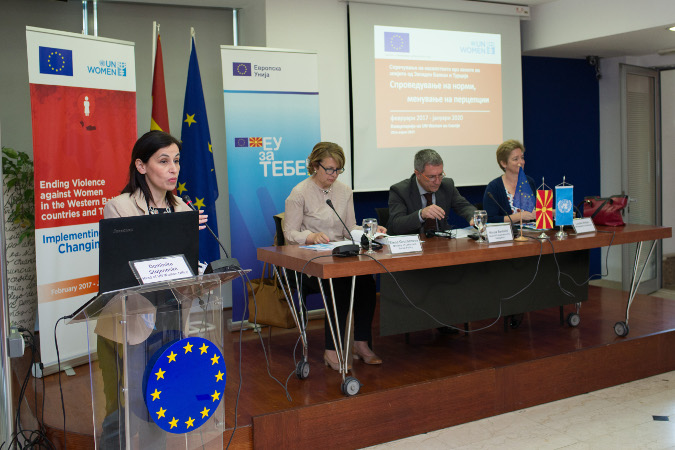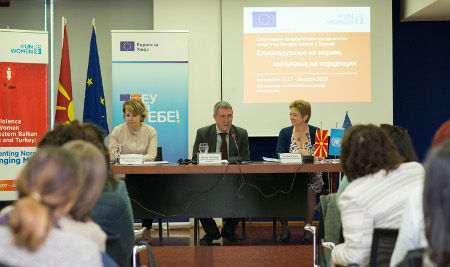UN Women and the European Union launch new initiative to focus on ending violence against women and girls in the former Yugoslav Republic of Macedonia
Date:

UN Women and the European Union organized a high-level workshop on 25 April 2017 to launch the former Yugoslav Republic of Macedonia component of "Ending Violence against Women in the Western Balkans and Turkey: Implementing Norms, Changing Minds,” a new regional programme that aims to combat violence and discrimination against women and girls in the Western Balkans and Turkey, funded by the European Union.
The workshop brought together government representatives, UN agencies, European Union representatives and the civil society at the EU Infocentre in Skopje. UN Women presented the the former Yugoslav Republic of Macedonia component of the programme, its objectives, expected results and planned actions.
The proposed activities in the former Yugoslav Republic of Macedonia are aligned with the national strategic documents on gender equality and ending violence against women and the recommendations from UN Human Rights Mechanisms and EU progress reports.
“This programme came about the right time, when discussions around ending violence against women started to extend beyond violence that is occurring in the family. We will address violence and discrimination against women but most importantly focus on addressing the root causes of inequality between women and men. We strongly believe it will pave the way toward ratification of the Istanbul Convention and its implementation,” said Dominika Stojanoska, Head of UN Women office in Skopje.

The Head of Cooperation at the EU Delegation, Nicola Bertolini, addressed the audience by emphasizing the significance of this programme and the importance of working with UN Women in the area of ending violence against women: “Legal advocates, security and frontline services, social services as well as civil society and organisations representing women's rights have a vital role to play in ensuring people feel protected against gender-based violence. If the system is not seen to be working and the services are not adequate, victims will not seek help. With this programme, we hope the delivery of promises made to combat gender-based violence and discrimination will be more effective and will reach down to the local level.”
While substantive efforts have taken place over the past years to tackle domestic violence, gender- based violence remains prevalent among Macedonian society and still lacks necessary attention and dedicated action.
“Addressing gender-based violence is one of the strategic priority areas in the National Strategy on Gender Equality. The Department for Equal Opportunities, in partnership with UN Women, will have increased engagement in this field and work towards ratification of the Istanbul Convention,” said Ms. Elena Grozdanova, State Advisor for Equal Opportunities in the Ministry of Labor and Social Policy.
The programme will focus on strengthening women’s voices to advocate for the development and implementation of normative frameworks in line with the Convention on the Elimination of All Forms of Discrimination against Women (CEDAW) and the Istanbul Convention, as well as on reviewing national strategic documents vis-a-vis international human rights and ending violence against women standards. Also, the programme will work together with civil society organizations (CSOs), media and government bodies to support them in developing and implementing innovative approaches to address harmful gender stereotypes.
The programme envisages close cooperation and extensive support to CSOs both as partners and beneficiaries.